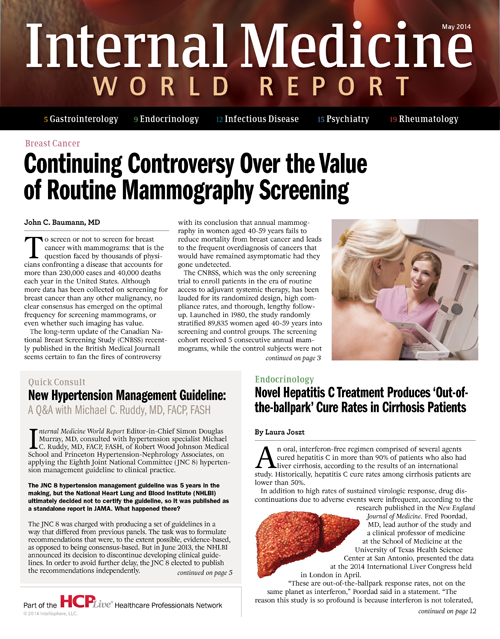Publication
Article
Internal Medicine World Report
Schizophrenia Spikes Risk of Dementia, COPD in Later Years
Author(s):
New research has uncovered increased rates of dementia, chronic obstructive pulmonary disease, and several other disorders in older adults with schizophrenia.

New research published in The American Journal of Geriatric Psychiatry has uncovered increased rates of dementia, chronic obstructive pulmonary disease (COPD), and several other disorders in older adults with schizophrenia.
For their 10-year study, Hugh C. Hendrie, MB, ChB, DSc, and researchers from the Indiana University Center for Aging Research and the Regenstrief Institute in Indianapolis observed a cohort of 31,588 patients aged 70 years on average who received care from a public health system between 1999 and 2008. Of those subjects, 1,635 (5.2%) were diagnosed with schizophrenia, 757 (2.4%) of whom had their diagnosis confirmed in a community mental health center.
The investigators discovered that schizophrenia patients had significantly higher rates of dementia, COPD, and hypothyroidism compared to those without schizophrenia. Overall, schizophrenia patients were discovered to have a higher mortality risk; however, they had a lower incidence of cancer.
Additionally, the researchers discovered the mean Medicaid or Medicare costs were significantly higher for schizophrenia patients, though they mentioned the increasing life expectancies for patients with mental disorders might explain this trend.
"People with serious lifelong mental illness have a life expectancy that is 20-25 years less than people without mental illness. However, many persons with these illnesses are now living into their 70s and 80s, and our healthcare system has very little experience in organizing their care in an effective manner," senior author Christopher M. Callahan, MD, commented in a statement. "This study shows the major challenges we face in providing excellent care to these older adults."
Based on the research findings, Hendrie recommended making changes in the healthcare system to better accommodate the influx of older individuals with mental disorders.
"As the population of older adults grows, the number of older patients with schizophrenia is also getting larger,” Hendrie noted. “We need to link their mental and physical health care in clinics where they feel comfortable and where they can be treated by clinicians who understand both their serious mental condition and their physical illnesses."






